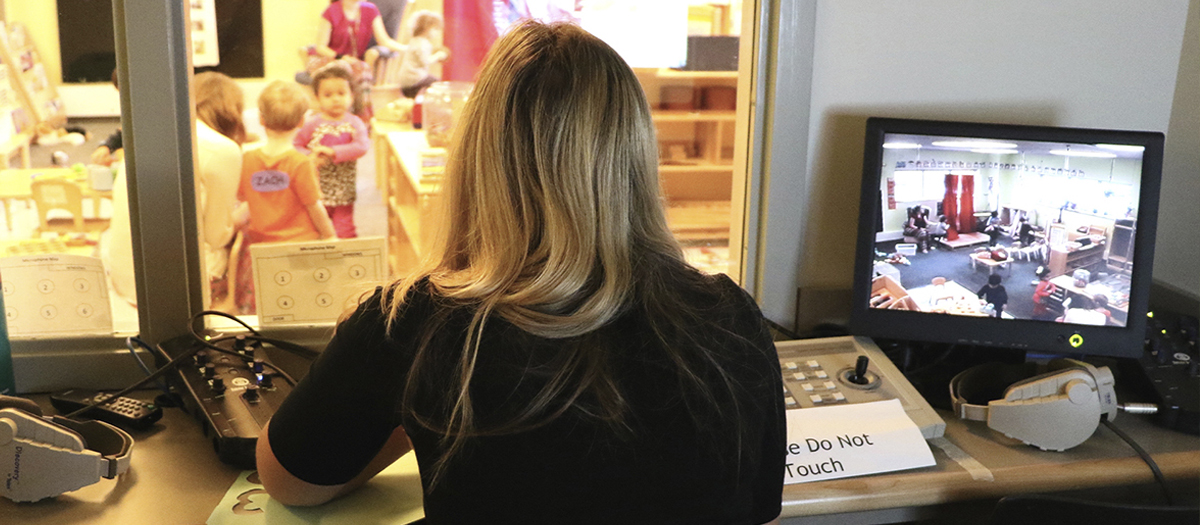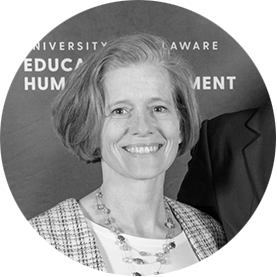Lab School

Research
Part of the mission of Laboratory Schools is to conduct, engage in, and support research. The Lab School engages in curriculum development, exploratory studies, and is a research site for university faculty and students. Master Teachers study and evaluate their own practice and regularly present about their work at regional and national conferences. In many cases, research findings are used to inform the work done at the Lab School and strengthen classroom practices and teaching.
The Lab School welcomes UD students and other researchers into our school. Before any research is conducted, the Director meets with the researchers to learn about their proposed studies to make sure that they will not be disruptive to children or teachers and that the study aligns with child development and appropriate early childhood practices. All research is approved by both the Lab School and the University Human Subjects Board.

Laura Cutler, a PhD candidate in the Department of Human Development and Family Sciences with the College of Education and Human Development, conducted research at the Lab School during the 2019-2020 school year. Her research centered around parent and child shared book reading and she credits the commitment to providing a primary research setting by the Lab School.
“To do this type of research, it is always best if you can work with families firsthand, rather than in a secondary nature. For me, primary data collection is an important way to make sure that you’re staying in touch with the needs of families and the Lab School was an ideal setting.”

Annette Pic, another graduate student in the Department of Human Development and Family Sciences with the College of Education and Human Development, utilized the Lab School for her research focus on nature play. Pic studied conflict occurrences in both the indoor and outdoor settings of the Lab School classes. She credits the families and their recognition of the significance of the Lab School as a research center as being beneficial to her work.
“The Lab School parents have also been extremely supportive and without all of the parents of my study participants supporting my research by giving consent, it wouldn’t have been as rich of a study.”
In recent years the Lab School has become a leader in the state of Delaware in the areas of outdoor learning and the integration of mindfulness-based practices into early childhood programs. These areas of interest/focus grew directly out of Master Teachers seeking solutions to perceived needs. Throughout the development of these programs, undergraduate and graduate students have been active participants in the process of examining impact, discovering and refining promising practices and building expertise. This process has included participation in ongoing teacher research, as well as, more formal research projects. Some additional studies in these areas include:
- Integrating mindfulness into early learning: Curriculum Development and Evaluation, Mindful teaching and learning in early childhood classrooms: Curriculum development, refinement, and collaborative staff development (Ginnie Morris, graduate student, Alexis Holzman, undergraduate student, Kendal Webb, undergraduate student)
- KIMOCHI’S and Community: A Descriptive Study of the Implementation of a Social and Emotional Learning Curriculum in a Culturally Diverse Early-Childhood Setting (Alexis Holzman, undergraduate student)
- Searching for Situated Decoding of Gender in Nature-Based Education (Abigail Decker, undergraduate student, Elon Univ.)
The Lab School supports research to deepen awareness of how young children learn and grow and to better support children and their families.
Research projects at the Lab School are reviewed and approved by the UD Institutional Review Board to assure compliance with federal requirements for the protection of participants in research studies. Protections include assurances of no harm and of anonymity.
All research projects are approved by the Lab School Director and Master Teachers to assure research activities will not disrupt or otherwise diminish a child’s experiences in the school.
Before each study, families obtain a description of the study and written informed consent form. Families decide whether they would like their child to participate or not. Families who choose to allow their child to participate in the study sign a written consent form that is returned to the researcher. Participation is voluntary, there will not be any repercussions should a family choose not to participate in a research study.
Research projects vary. They may involve interviewing, observing, testing, videotaping families and children, and asking parents or teachers to fill out questionnaires. In some cases, research activities may take place in the homes if families agree. Children are always thoughtfully introduced to the researcher prior to each investigation and children’s responses are honored and respected.
Children also provide assent for their participation; they can choose not to participate in a study even if parents have provided formal consent.
